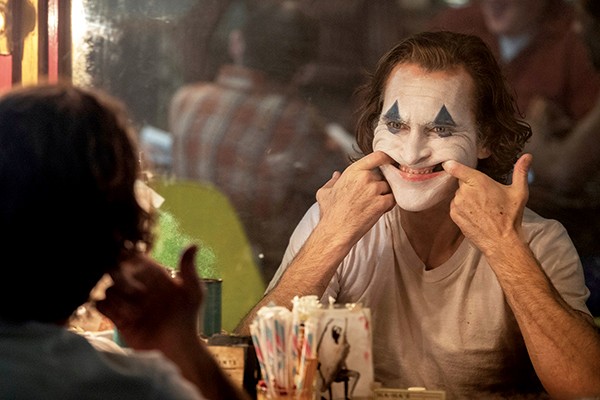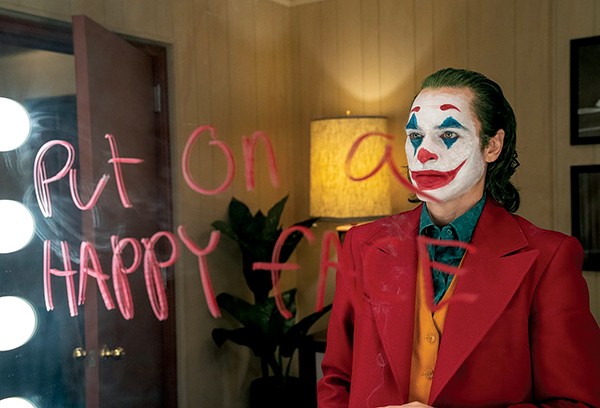Hollywood legend has it that during the heyday of the studio system there was a sign over the water fountain in the Warner Brothers writers building that read: “What does the bad guy want?”
Writing for the hero is easy — or at least it used to be. Superman stands up for “Truth, Justice, and the American Way.” Wonder Woman watches over the weak and innocent. Batman protects Gotham City from evil weirdos in costumes.
Writing for villains is harder. The worst kinds of villains are the ones who are simply there to serve as a punching bag for the hero. They may look menacing and throw the occasional one-liner, but their goals are nonsensical and their psychology nonexistent.

Send in the clown! Joaquin Phoenix as Arthur Fleck in Joker.
Our recent comic book film obsession has brought a parade of idiotic villains. There is no worse offender than Thanos, the big bad guy from the Marvel Cinematic Universe. He spent upwards of 10 movies trying to assemble a magical artifact that would allow him to bend reality to his will in order to stop what he saw as an out-of-control population explosion. Never mind that the universe is a brain-blastingly big place, chock-full of resources easily available to a civilization that drives spaceships like they were Bird scooters. If you can create and destroy like a god, why not snap your fingers and make enough food for everyone?
Which brings us to Joker. The Clown Prince of Crime’s motivations have historically been pretty thin, falling squarely in the “provide a punching bag for the hero” category throughout much of the character’s 80-year history. Frankly, this wasn’t much of a problem in the classic comics. But now, with Warner Brothers’ entire billion-dollar film operation resting on making Batman v. Superman: Our Moms Are Named Martha as gritty and realistic as possible, the Joker needs a Lawrence of Arabia-level character study.
Where did the Joker come from? What’s up with the clown schtick? Is his mom named Martha? All these questions and more are answered definitively by director Todd Phillips and Joaquin Phoenix, and it only takes two ponderous hours.

Spoiler alert: His mom is named Penny Fleck. Her son Arthur (Phoenix) takes care of her in a kitsch-filled apartment in a 1981 Gotham that bears a startling resemblance to the decayed New York of Taxi Driver. In that classic, writer Paul Schrader, director Martin Scorsese, and actor Robert De Niro asked, “What turns an ordinary man into a political assassin?” (“He wants to impress Jodie Foster” turned out to be a startlingly accurate motivation.)
De Niro is here, seemingly to add gravitas to the movie that asks, “Why does a guy dress like a clown to get his ass kicked by a guy who dresses like a bat?” He plays Murray Franklin, a talk-show host who delivers his monologue in front of a Johnny Carson-like rainbow curtain, and who inadvertently gives the Joker his name while mocking Arthur’s attempts at stand-up comedy in front of millions of viewers. Needless to say, this does wonders for our anti-hero’s mental stability.
To be fair, Arthur has apparently been a punching bag all his life. In the movie’s crushingly depressing first hour, he is beaten up twice by the roving gangs of thugs who apparently make up the population of Gotham — at least the ones who are not obscenely rich and named Wayne. Phoenix is an incredibly gifted actor, and his performance here is scarily committed. But the most realistic performance in Joker is by Brett Cullen who portrays Thomas Wayne, doomed father of the eventual Batman, as a condescending jerk.
The most memorable parts of the movie emerge from its lead’s bottomless pool of talent. Phoenix has covered this territory before as the mentally scarred veteran who falls for Philip Seymour Hoffman’s proto-Scientology cult in The Master. But without someone of Hoffman’s caliber to play off of, Phoenix is left to spin his wheels. It’s a tremendous expenditure of energy that goes nowhere. Joker feels completely unnecessary. We’ve seen two onscreen origin stories of the Joker. The first was in Tim Burton’s 1989 Batman, and it took about five minutes to set up Jack Nicholson’s Joker as an ambitious gangster driven to megalomaniacal insanity after being dipped in toxic chemicals. The second, and more chilling, was Heath Ledger’s conflicting recounting of multiple origin stories in Dark Knight, which really tells you everything about the character you need to know: He’s a nihilist, and he’s nuts.
Not to spoil the party, but that’s where we’re at when we finish Joker, too. It just takes two grinding, Batman-less hours to get there. Joker is by far the most depressing comic book movie ever made. On the one hand, it’s kind of amazing that all you had to do to gross $234 million was slap a brand name on a bland remake of The King of Comedy. But on the other hand, Joker is just downright unpleasant to sit through. But I guess we’ll reconvene here in a few years for the inevitable, grim-dark Poison Ivy movie.
Actually, I kinda want to see that.
Joker